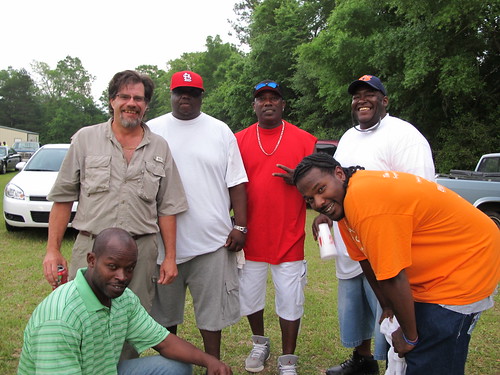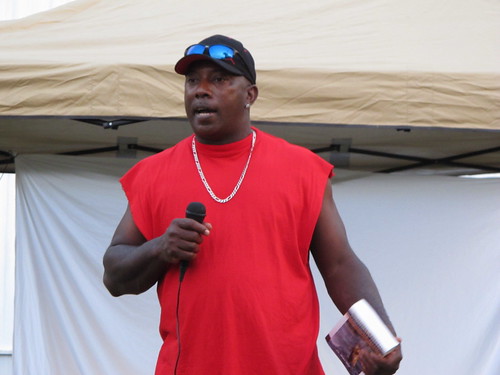Gulf Clean Up Workers Complain About the Human Toll of the BP Oil Disaster
More than 60 miles north of the flashy beach casinos of Biloxi, MS, you come to a place where the earth turns to reddish clay and the lush green fields are stripped of their timber. It’s a place where locals struggle with high unemployment in the most poverty stricken state in the country. The lifespan of an African American born today in Mississippi is the same as an average American in 1960.
A year ago when the BP well blew and spewed millions of gallons of oil daily into the Gulf, local residents near the tiny town of Lucedale jumped at the chance to take jobs to clean up the coast. After all, a $12 an hour job was good money in these parts. And everyone wanted to do their part to defend the coast. But soon they say they realized things were not what they had been promised; training sessions were cut, and respirators were nowhere to be found even though they were described in training manuals.

Former oil clean up workers from Lucedale, MS All photos: Rocky Kistner/NRDC
“I got no hazmat training and they said it wasn’t safe to wear respirators,” says Lucedale resident Jason Odom. “They gave us our training cards but we never got the training.”
That was the consensus of others attending a “teach-in” last week near a community center outside of Lucedale organized by Exxon Valdez clean up expert Riki Ott and other organizers along the Gulf coast. Workers who toiled in 100 degree temps and thick Louisiana crude last summer joined up with commercial fishermen and other coastal residents who complain of serious health problems they blame on exposure to the oil and dispersants.
Riki says they all have common symptoms that people share across the Gulf, from the Florida panhandle to the Texas border, all areas impacted by BP oil. Riki, who has written a book on the Exxon disaster called Sound Truth and Corporate Myth$: The Legacy of the Exxon Valdez Oil Spill, has organized countless meetings in the region to explain the common health prooblems experienced after the Exxon Valdez spill. And she says the same problems are apprearing in the Gulf.
"I'm trying to educate people about what we went through in Alaska," she says. "We all need to stand up together and we've got to keep on fighting the powers that don't want to hear this."

Riki Ott shares information with residents of Lucedale, MS
Nearly all their stories had the same theme. People worked hard, were not given proper training and equipment, and were told that if they complained they would be fired. So, they say, they worked and didn’t complain. But that was last summer. Now, many say they are sick and no one has paid their medical bills.
Take the case of Lucedale resident Janet Hennessey. A mother of 4 and grandmother of 2, she says she worked at BP’s boat decontamination facility in Pascagoula. Boats from BP’s Vessel of Opportunity program would be brought in to be cleaned from the tar like oil that stained the ships, some carrying heavily oiled boom and containers of crude that oozed into every boat cavity from top to bottom.
“It made me sick,” Janet says. “I often would have to stop while driving to work and vomit on the side of the road. We had to clean up the oil and maggots and algae would be all over the place. There were hundreds of people working there. And we never saw a respirator.”
Janet says she still feels sick and she fears that the oil she brought home on her clothes may have contributed to health problems her granddaughter now experiences.

Janet Hennessey of Lucedale, MS
Roosevelt Love is another who says he got minimal training and virtually no protective gear. And he says he’s still suffering because of it and his doctor is concerned about continuing heart palpitations and breathing problems since he worked on the clean up.
“We worked 12 hours a day seven days a week picking up boom and cleaning up oil. I saw people who passed out from working out there. But we were told not to complain or talk to the press about it or we would be fired. You started to feel like you were being used.”
Ronzie Thomas was an oil clean up supervisor making $15 dollars an hour. He says he got little safety training and never was allowed to use a respirator, even though he says he was working in 100 degree heat and choking on toxic fumes. He still complains of headaches, a sore throat and memory loss.
“The oil would get all over us and we all had the same symptoms, rashes, respiratory problems and coughs. We’ve all been to the doctor but nobody ever paid for our medical expenses.”

Former BP oil clean up supervisor Ronzie Williams of Lucedale, MS
Before the anniversary of the BP oil well blowout, Ronzie and four others were bused to Washington to attend the massive Power Shift conference, a gathering of 10,000 youths from around the country. He says they were well received and got national media attention. But since their return to Mississippi, the local press has been silent. No stories about their medical problems or their recent national exposure.
“It’s shameful that turtles and dolphins get more press than people here," Ronzie says. “But our cause is just, our sickness is real, and we will be heard.”
As nightfall descended on this rural Mississippi gathering, crickets chirped and barbque grills smoked. Residents forgot their painful experiences and new friendships were made. They enjoyed the company of people who shared a common vision, a mission to tell the world about the human costs of this oil disaster. They seemed a world apart from their troubles in the Gulf.
But 50 miles away on the coast, tar balls continued to wash in, a constant reminder that the troubles of last summer are far from over.
